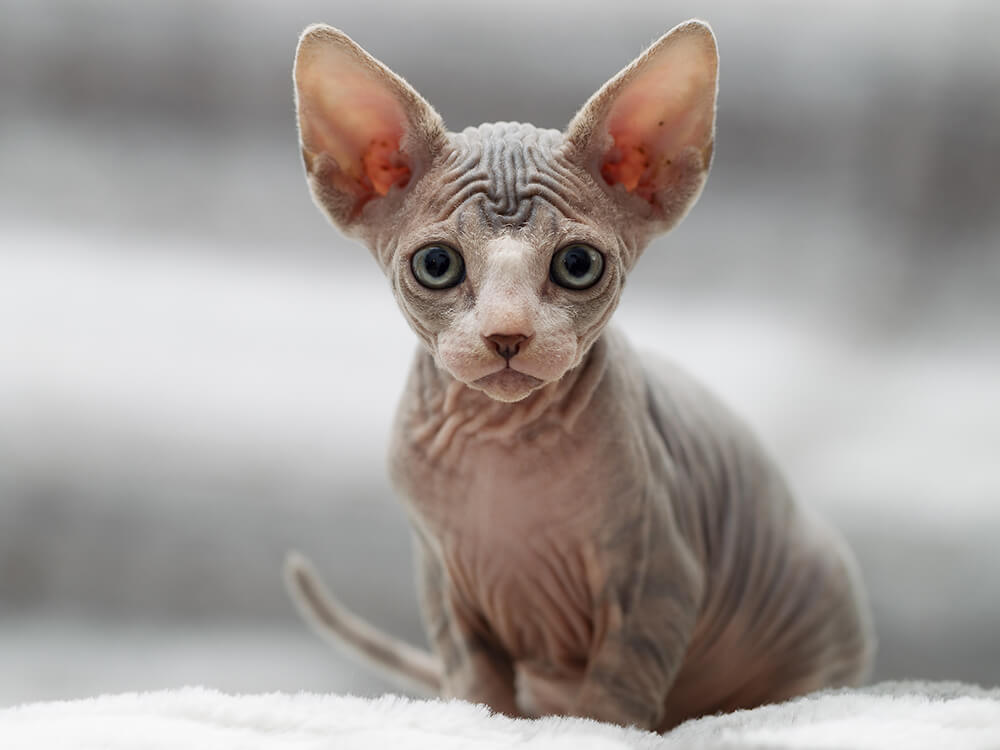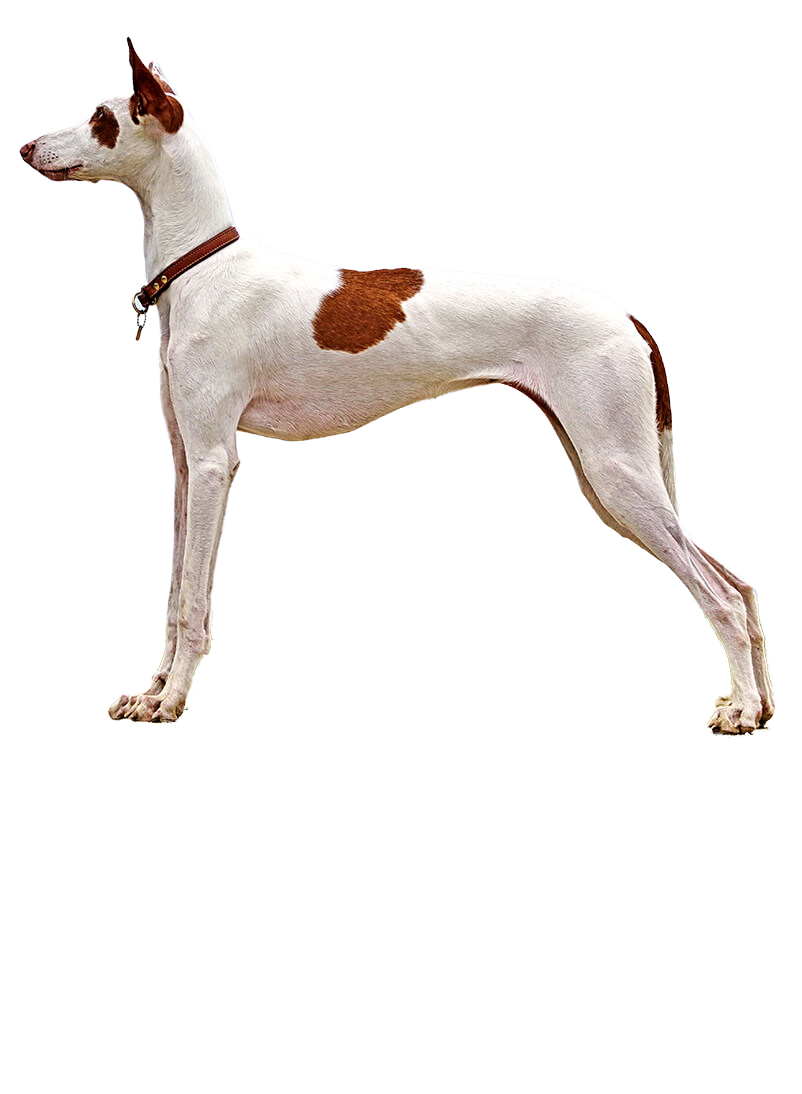Not the breed you're looking for?
Click Here
Featured Story

In smaller apartments, the right feline companion can make a world of difference. Explore 14 small cat breeds tailored for cosy living, and let your … [Read More...]
The Ibizan Hound was originally bred as a sighthound to hunt rabbits and other small game. Tall, agile, and, athletic, the Ibizan Hound is a great companion dog for the active and adventurous family.
The Ibizan Hound has a clownish personality with inclination to mischievous antics. However, the Ibizan Hounds’ lack of street smarts makes them poor guard dogs and watchdogs.
Despite the Ibizan Hound's being stubborn and independent, he is eager to please which makes him fairly easy to train. The Ibizan Hound has a smooth and short coat that only requires weekly brushing. Due to his high activity levels, he requires lots of exercises to burn off extra energy.
As the name suggests, the Ibizan Hound originated in the Island of Ibiza, one of the Balearic Islands off the Mediterranean coast of Spain. It is a highly-prized scenthound breed used to hunt rabbits and other small game. It is a lithe and fast dog that can hunt on different types of terrain.
Records suggest that the breed's ancestry can be traced back to 3400 B.C in ancient Egypt. It is said that royal dogs resembling the Ibizan Hound are found in many artefacts in tombs of pharaohs such as the Hemako of the 1st Dynasty, Nevermat of the 4th Dynasty and Tutankhamen of the 18th Dynasty. However, this was refuted by genetic research showing that the modern-day Ibizan Hound, and its cousin the Pharaoh Hound, are new reconstructions of an older type which lineage did not go back thousand years ago.
Mysterious ancestry aside, it was the Phoenicians, well-travelled traders, who may have brought dogs from Egypt to Ibiza in the 8th or 9th century B.C. when they came to settle. In the 1950s, a Spanish dog breeder and show judge living a short distance from Ibiza took an interest in the breed and started a controlled breeding programme. From then the dog breed was actively promoted as Ibizan Hounds all throughout Europe.
The American Kennel Club first recognised the Ibizan Hound in 1979. Its first appearance at a dog show is in 1980 at the Westminster Kennel Club. Today, the Ibizan Hound remains a rare breed.
The Ibizan Hound is described as having a deer-like or Greyhound-type body, which is elegant, lithe, athletic and tall. It stands 56 to 74 centimetres and weighs 45 to 50 pounds. It has a magnificent bearing of an ancient noble dog with its long arched neck leading into a long wedge-shaped head. Its large triangular ears stand when it is alert or excited while between the ears is a white mark referred to as the "axe mark," which is characteristic of the breed. The eyes are small and reflect the colours of caramel or amber. Nose is flesh-coloured or pink, which stands out beyond the jaw and is convex in shape. Its tail hangs naturally low or carried high when it is alert. Its body is compact with a tucked abdomen.
Ibizans come in two types of coats, shorthaired and wirehaired. The coat can be red or white or a combination of the two colours. The most common Ibizan Hounds have a white base with red patches. Because of the Ibizan's tight, smooth and short coat, it is low maintenance on the grooming front. With this said, a weekly brushing will suffice to make sure its coat remains tidy, and skin maintains its good condition. However, the wirehaired Ibizan requires a bit more work as it needs occasional combing, with dead hairs hand stripped a couple of times a year. Ibizan Hounds also shed throughout the year and more so during autumn and spring. This will require frequent brushing.
Aside from coat care, make sure to check your Ibizan for any lumps or injuries. Also, remember that this dog breed sports a single coat, which means it can feel the cold and quickly catch chills compared to breeds with double coats. Don't forget to also check and clean its ears on a regular basis to avoid infections. Trim its nails to prevent painful overgrowth and cracking or splitting. Also, brush its teeth to remove tartar and keep bad breath and gum diseases at bay.
The Ibizan Hound has a mixed temperament of a noble and wild hunter breed. Indoors it desires to be pampered and is usually quiet around the house, while outdoors it is lively and will chase anything that moves, which it considers as prey. Its trademark ears are super sensitive and will twitch when it senses someone coming. Although it does not bark to alert, one look at the ears will tell you. Regardless, this dog breed is not an ideal watchdog or guard dog.
With its family, the Ibizan is calm, affectionate, and loyal. Ibizans are true clownish dogs, delighting in making their family happy with their harmless antics. However, it is reserved and aloof around strangers but never shy or aggressive. Since it is an intelligent, independent dog and a people-pleaser, the Ibizan Hound is fairly easy to train. However, it may be stubborn at times, so positive reinforcements in the form of treats and snacks will help get it back on track.
Ibizan Hounds are known to be gentle, calm and fun-loving dogs that thrive in a family environment. Therefore, they are also great with children. With this said, children must be taught how to handle an Ibizan Hound especially since this dog breed is sensitive by nature. Of course, it also follows that any interaction between the Ibizan and the children must be supervised to make sure playtime does not cause accidents. When it comes to other household pets, the Ibizan Hound is known to be good around other dogs and will rarely show any aggressiveness. However, since the Ibizan is a scenthound, smaller animals may seem like fair game, which may lead to a catastrophic result.
A typical serving for an adult Ibizan Hound is 2 to 3 cups of high-quality dog food per day. Servings must be divided into two equal meals to prevent bloating. However, the amount and type of food to serve will depend on many factors such as the dog's age, size, gender, health, activity level and metabolism. It is highly recommended that you take your dog for a veterinary consultation to determine a balanced and nutritious diet tailored to your dog's needs.
Here is an example of a typical daily calorie requirement of an adult 50-pound Ibizan Hound:
To ensure that your Ibizan is provided with its nutritional needs, select a high-quality and vet-recommended dog food brand that is specially formulated for the Ibizan's size. Animal protein is essential for muscle growth and must be the top ingredient in its diet. Examples of protein sources include chicken, lamb or beef.
When properly cared for, the Ibizan Hound can live up to 14 years. However, it is inevitable that it will inherit a few genetic health disorders common to its breed. These health disorders include Seizures, Allergies, Axonal Dystrophy, Cataracts, Deafness and Retinal Dysplasia. At this point, owners should be aware of the signs and symptoms of these disorders by consulting with a veterinarian for preventive measures.
In addition to preventive measures, Ibizan Hounds must meet its activity requirement to ensure its overall health and happiness. Ibizans need to engage in rigorous activities such as running or sprinting, hiking, jogging, and galloping across a spacious enclosure with high fences. Why high fences? The Ibizan is known to be an excellent jumper, so only a 6-foot high fence will keep it from escaping. However, you should not worry if you live in the city. Ibizans are city dwellers as long as they are given at least 2 hours to sprint or exercise. Small apartments are not an option because of its size.
If you are set on getting an Ibizan Hound, be ready to pay £300-£500 for a well-bred pedigree puppy. Feeding and making sure your dog stays healthy are all part of caring for it. High quality dog food and treats can set you back £40-£50 a month. You would also need to spend on dog accessories such as leads, collars, bowls, crates, beds, and toys. The combined initial cost for these things is estimated at £200.
Moreover, you may have to consider paying for pet insurance to offset medical bills in case your dog suddenly falls ill or gets into an accident. Depending on where you live, your dog’s size and weight, and its health and age, a time-limited cover can cost £21 a month while a lifetime one can cost up to £41 a month. Generally, insurance companies do not cover routine veterinary consultations, initial vaccinations, boosters, and neutering or spaying, so you may also have to spend an additional £1000 annually for these services.
On average, the minimum cost to care for an Ibizan Hound is £70-£100 per month depending on your pet insurance premium. Lastly, this estimate does not include the rates for other services such as walking and grooming.

Are you sure the Ibizan Hound is the best breed for you? Take the Pet Breed Selector Quiz to find your perfect breed match.
Dog Breed Selector QuizWill a Ibizan Hound be too much for you to handle? Take our Pet Finder so you can find the most suitable breeds for you.